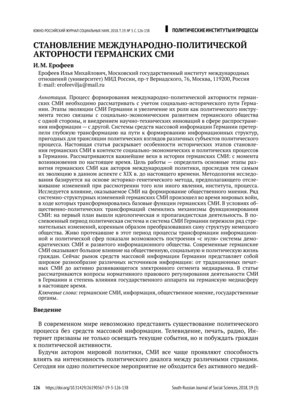Abstract
To analyze the way German Mass Media have acquired their political weight on the international arena, it is necessary to do so against the background of the socio-historical development of Germany. On the one hand, the stages of German Mass Media evolution and their growth as a political instrument are closely connected with the socio-economic development of German society and, on the other hand, with the introduction of scientific and technological innovations into the sphere of information dissemination. The systems of Mass Media in Germany have undergone deep transformations on their way to form informational structures able to relay political views of different participants of the political process. The aim of the paper is to determine the main stages in the development of German Mass Media as an influential participants of international politics, parallel with following their evolution as such, since the XIXth century up to nowadays. The methodology of the research is based on the historical-genetic method which presupposes tracking the changes while analyzing any phenomenon, institution, or process. The paper analyzes how Mass Media exert their influence on forming public opinion. A number of changes in the system and structure of German Mass Media occurred during World Wars when their main functions were transformed. In view of social and political transformations, Mass Media functioning mechanisms were replaced: now, ideology and propaganda came to the fore. In the post-war period, both the political system and Mass Media in Germany went through a number of swift alterations that have radically changed the very structure of German society. The active flow of transformations in the informational and political spheres gave the opportunity to build the system of democratic Mass Media and a developed information society from the very beginning. Contemporary German Mass Media exert a great influence upon the citizens’ public, social and political life. Nowadays, Mass Media information market in Germany represents a wide variety of different sources of information, from traditional printed press to an actively developing electronic segment of the mediamarket. The paper analyzes the problems of normative and legal regulation of the activity of Mass Media in Germany and the level of state influence upon German media sphere at present.
Keywords
References
Беспалова, А.Г., Корнилов, Е.А., Короченский, А.П. и др. (2003). История мировой журналистики. Ростов н/Д: МарТ.
Биск, И.Я. (1995). Пресса Веймарской Германии. Иваново: Изд-во Ивановск. ун-та.
Вартанова, Е.Л. (2003). Медиаэкономика зарубежных стран. Учебное пособие. М.: Аспект Пресс.
Вороненков, М.Ю. (2004). Средства массовой информации Восточной Германии: от тоталитаризма к демократии (Докторская диссертация). Москва.
Вороненков, М.Ю. (2002). Журналистика восточной Германии: от тоталитаризма к демократии. Санкт-Петербург: Изд-во С.‑Петербургского университета.
Вороненкова, Г.Ф. (2001). Средства массовой информации ФРГ в 2000 году. Вестник Московского университета, 5, 52–56.
Вороненкова, Г.Ф. (2003). Средства массовой информации ФРГ в 2002 году. Вестник Московского университета, 2, 32–36.
Вороненкова, Г.Ф. (1998). Средства массовой информации Германии в 90-е годы. Москва.
Вороненкова, Г.Ф. (1999). Путь длиною в пять столетий: от рукописного листка до информационного общества. Национальное своеобразие средств массовой информации Германии (Докторская диссертация). Москва.
Вороненкова, Г.Ф. (2002). Средства массовой информации ФРГ в 2001 году. Вестник Московского университета, 5, 25–30.
Вороненкова, Г.Ф., Чесанов, А.А. (2001). Периодическая печать Германии. Санкт-Петербург: Изд-во С.‑Петербургского университета.
Литвиненко, А.А. (2007). Пресса ФРГ начала ХХI века: модернизация оргструктур и содержания газет в условиях кризиса медиарынка (Канд. диссертация). Санкт-Петербург.
Орлов, Ю.Я. (1970). Печать ФРГ. Москва: Изд-во Моск. ун-та.
Пратканис, Э.Р. (2003). Эпоха пропаганды: Механизмы убеждения, повседневное использование и злоупотребление. СПб: Прайм-Еврознак.
Рисс, К. (2006). Кровавый романтик нацизма. Доктор Геббельс. 1939–1945. Москва: Центрполиграф.
Хеллак, Г. (2002). Печать, радио и телевидение в Германии. Бонн: Интер Национес.
Хене, Х. (2003). Черный орден СС. История охранных отрядов. Москва: ОЛМА-ПРЕСС.
Branahl, U. (2000). Medienrecht. Wiesbaden.
Breßler, E.S. (2009). Die Rundfunkwirtschaft in der Weimarer Republik. In: Von der Experimentierbühne zum Propagandainstrument. Köln: Böhlau Verlag.
Das Grundgesetz der BRD. Режим доступа http://www.bundestag.de/parlament/aufgaben/rechtsgrundlagen/grundgesetz/gg_01/245122
Das Statistik-Portal. Режим доступа https://de.statista.com/themen/101/medien/
Erman, H. (1954). August Scherl. Dämonie und Erfolg in Wilhelminischer Zeit. Berlin: Universitas Verlag.
Fischer, E. (1975). Leopold Ullstein (1826–1899). In: Fischer H.-D. (Hrsg.) Deutsche Presseverleger des 18. bis 20. Jahrhunderts. Pullach bei München.
Fischer, H.-D. (1975). Alfred Hugenberg (1865–1951). In: Ders. (Hrsg.) Deutsche Presseverleger des 18. bis 20. Jahrhunderts. Pullach bei München.
Germany Freedom House mit dem Freedom of the Net Report 2015. Retrieved from https://freedomhouse.org/report/freedom-net/2015/germany
Hitler, A. (1998). Mein Kampf. Originally 1925–1926. Mariner Books.
Huber, C.K. (2008). Medienkonzerne. In: Hachmeister L. (Hrsg.) Grundlagen der Medienpolitik. Ein Handbuch. München: DVA.
Internet usage statistics. The Internet Big Picture Internet World Stats. Retrieved from https://internetworldstats.com/stats.htm
Kassautzki, C. (2000). Presse in der Bundesrepublik Deutschland. Stuttgart.
Koszyk, K. (1966). Deutsche Presse im 19. Jahrhundert. Geschichte der deutschen Presse. Bd. 2. Berlin: Colloquium.
Koszyk, K. (1972). Deutsche Presse 1914–1945. Geschichte der deutschen Presse. Bd. 3. Berlin: Colloquium.
Manteuffel, P. (1994). Wie der Rundfunk in Deutschland begann. ELRO Verlagsgesellschaft mbH, Königs Wusterhausen.
Meyn, H. (2004). Massenmedien in Deutschland. Konstanz.
Obergaßner, P. Erster Weltkrieg und Propaganda. Der geheuchelte Krieg. (2014, 21 Oktober). Süddeutsche Zeitung. Режим доступа http://www.sueddeutsche. de/politik/erster-weltkrieg-und-propaganda-der-geheuchelte-krieg‑1.1891071
Scharf, W. (1975). Rudolf Mosse (1843–1920). In: Fischer H.-D. (Hrsg.) Deutsche Presseverleger des 18. bis 20. Jahrhunderts. Publizistik-historische Beiträge. Band 4. Pullach bei München.
Solomon, L. (1906). Geschichte des Deutschen Zeitungswesens. Erster Band. Oldenburg / Leipzig, Schulzesche Hof-Buchhandlung.
Stöber, R. (2005). Deutsche Pressegeschichte. Konstanz: UVK.
Stöber, R. (2014). Deutsche Pressegeschichte. Von den Anfängen bis zur Gegenwart. 3., überarbeitete Auflage. Konstanz, München: UVK.
Stürmer, M. (1994). Das ruhelose Reich. Deutschland 1866–1918. Berlin: Siedler.
Treude, B. (1975). August Hugo Friedrich Scherl (1849–1921). In: Fischer H.-D. (Hrsg.) Deutsche Presseverleger des 18. bis 20. Jahrhunderts. Pullach bei München.
Welche der folgenden sozialen Netzwerke haben Sie in den vergangenen drei Monaten genutzt? (2018). Retrieved from https://de.statista.com/statistik/daten/studie/589708/umfrage/nutzung-von-sozialen-netzwerken-in-deutschland/
Wenkel, K. (1926). Rudolf Mosse — ein Schöpfer des deutschen Zeitungswesens. In: Der Kaufmann und das Leben. Beiblatt zur Zeitschrift für Handelswissenschaft und Handelspraxis. Heft 6. Juni, 41–45.

